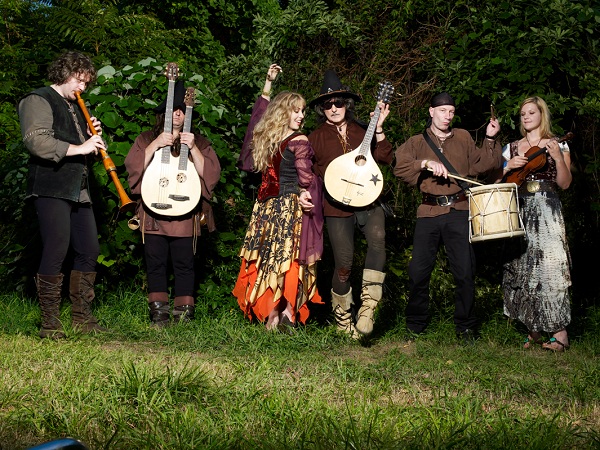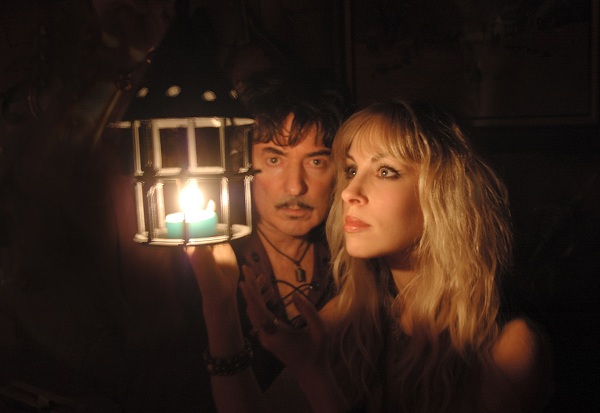By: Dr. Matt Warnock
Photos courtesy of R. B.
Having known guitar legend Ritchie Blackmore from his days in Deep Purple and Rainbow, I wasn’t quite sure what to expect from his newest CD Autumn Sky, which was recorded with his Renaissance influenced ensemble Blackmore’s Night, but I have to say that I really enjoyed the record.
I know that some of Ritchie Blackmore’s die-hard metal fans won’t give this band a chance, but they might just be judging the book by its cover, or in this case the album by its sleeve, and not giving the music the dues it deserves.
The record, and all the albums in Blackmore’s Night’s catalog, mix traditional Renaissance music with modern influences in a manner that melds the old with the new, providing entertainment for fans of each genre as well as acting as an introductory vehicle to the older style of music that younger fans may not be familiar with.
Named after Ritchie Blackmore and his wife Candice Night, the group features enchanting vocal work alongside the world-class guitar playing that’s made Blackmore a living legend. Though you may not think this style of music is your cup of tea, give it a chance, you might just find that it’ll become one of your favorites.
Guitar International recently caught up with Ritchie Blackmore to talk about Autumn Sky, the instruments he plays on the record and his songwriting process.

Ritchie Blackmore & Candice Night
Matt Warnock: The new album, Autumn Sky, features a mixture of Renaissance and contemporary songs and arrangements. When you were choosing and arranging the songs, were you conscious about maintaining that mixture throughout the record, or were these just the songs and arrangements that spoke to you the most?
Ritchie Blackmore: We have an array of ideas that I keep on audio tape to refer to when we’re going to record a CD. I don’t consciously choose one Renaissance themed song, one original, one instrumental and so on. I just review the songs that I’ve put on tape and sometimes a track will catch my attention from a CD of Renaissance songs, or perhaps I’ll hear something to cover while out playing acoustic instruments at our gatherings. The whole process is really just a “feel” type of thing.
Actually, one of our main dilemmas is that we’re sometimes unsure how organic to make a song while recording it. I happen to love the traditional and purist sounds. Sometimes we slip down the middle between people that love Renaissance music, because we don’t make it Renaissance enough, and people who don’t like that type of music.
At the end of the day you just have to do what’s right for you. One of the most freeing aspects about being in this band is that we can play any type of music and genre and not be trapped in a box of one musical style. It’s a great exercise.
Matt: On the song “Vagabond” you play a solo introduction that sounds very organic and flows really nicely. Was this opening improvised in the studio and is improvisation something you like to bring to Blackmore’s Night, alongside the intricate arrangements?
Ritchie Blackmore: Yes. It was improvised. I did about five minutes of improvisation on mandola for that song. Then we just cut four minutes of it out and threw on the 1 minute intro. I had no idea what I was playing at the time. I was just improvising with the theme of the song in mind.
Matt: You cover “Celluloid Heroes” by the Kinks on the record, what is it about this song that inspired you to include it on the new album?
Ritchie Blackmore: I love this song, have done ever since I first heard it back in ’75 or ’76. We actually played this at one of the musical gatherings with our friends. After hearing Candy sing it I knew it had a lot of potential. I think it was a very good vocal from Candy, although we had to rearrange the lyrics as we did a modulation, and lyrically the flow needed to fit with the arrangement. The fact that George Saunders is one of my favorite actors had nothing to do with it.

Blackmore’s Night
Matt: One of the songs that really spoke to me on the record was “Strawberry Girl.” Who is the strawberry girl, is she real or fictional, and when you were working with Candice on that song did you write the music first, or her the lyrics, or both at the same time?
Ritchie Blackmore: I wrote the melody first and then Candy came up with the lyrics, which is our usual procedure. I don’t get involved with the lyrics, but we did dedicate the CD and that song in particular to our new addition, our daughter Autumn. Candy told me, as she was pregnant while we wrote and recorded the CD, that she didn’t know if we were going to have a boy or a girl. So when she wrote the songs they took on a special meaning for her. Then when it turned out that we had a little girl, the songs made sense on other levels, and she knew that the reason she wrote those lyrics were for Autumn. So, what began as fiction came to be true.
Matt: Besides playing guitar on the record, you also play the mandola and mandolin. Both are stringed instruments, but are tuned and strung different to the guitar. Is it tricky to change your mind set when going from one instrument to the other, because of the different tunings, and do you prefer to record each one separately when you get into the studio, recording all the Mandola parts consecutively before moving onto the guitar parts for example?
Ritchie Blackmore: I have to readjust whenever I pick up the mandola and the mandolin as they are tuned in 5ths, and I have to feel my way around the instrument. When I’m playing a mandolin and the mandola, I don’t know sometimes what chord I’m playing or what key I’m in, but I find that refreshing because it’s a sense of adventure not knowing exactly what I’m playing. I tend to go to different places that are not familiar. Also, when I used to play the cello, play the same way, and that’s how I got the riff for “Gates of Babylon,” which I wouldn’t have gotten to by writing on the guitar.
Matt: Who makes your mandola and mandolin, and do you have multiple instruments or do you prefer to get to know one particular instrument and stick to that on stage and in the studio?
Ritchie Blackmore: I go through various favorites. I play Fylde mandolas and mandolins, Weber mandocellos, and I have an old Goya mandolin which projects very well. That one is interesting as it’s an inexpensive instrument. I play a Kawakami guitar on stage and a Helmut Gotsky hurdy gurdy. I have 4 Fylde instruments, 3 hurdy gurdys, 1 mandolin, 1 mandocello and 1 Freshwater mandola.

Ritchie Blackmore & Candice Night
Matt: The band is going to be on tour in Germany this coming summer, and your records have sold well there as well. Why do you think the German people have taken to Blackmore’s Night as much as they have over the years?
Ritchie Blackmore: We always have a pilgrimage to Germany once per year. It’s my favorite place to play because I can pick up music from German bands that are playing Medieval and Renaissance music. We have concentrated on that country. I was inspired to play that type of music after seeing a German Renaissance band called Des Geyers, a more authentic Middle Aged, as they say there, or Medieval band. They play Middle Age, I play old age. [Laughs]
Matt: The album also went Gold in Russia, congratulations. I’m wondering, as I’m sure your Russian fans are, but do you have plans to take the band on a tour of Russia in 2011?
Ritchie Blackmore: Yes, we’ll be playing there. I love the Russian countryside. I’m not a big fan of the cities, but when we go on our train rides throughout the country, I find it fascinating to see the little houses. We also get some great musical ideas from Russia.
Sometimes we don’t have a clue who originally did the songs to begin with, like the idea for “Toast To Tomorrow,” is from a very old Russian melody that we picked up during our travels there. I love the use of accordions with guitars, balalaikas, stand-up bass, and hammered dulcimers.
Matt: In 2010 you agreed to be an advisor to the National Guitar Museum. How did this relationship develop and how what role do you see yourself playing as the Museum project grows and gets set to launch?
Ritchie Blackmore: The relationship began when HP Newquist contacted us to see if I was interested. It sounded like an interesting project and we’ve kept in contact about their process and direction. They’re now adding traditional instruments to their museum which should be interesting.
Matt: The band has released a new album just about every 2 years since your first album in 1997. With the success of Autumn Sky, are you already writing, arranging and planning out your next album, and if so when can we expect that album to be recorded?
Ritchie Blackmore: We’re going to take a year off from writing so a new studio won’t be available for another year or two, but we are thinking about putting out a live record with different interpretations and treatments of some of the songs that we’ve previously recorded.
Many of the CDs we’ve done have 16 tracks on them, so it’s almost like many of them are double CD. There’s a lot of material that’s out there already. Plus we want to take this year and concentrate on touring. And we are always writing, year round.
Tweets that mention Ritchie Blackmore Interview | Guitar International Magazine -- Topsy.com (13 years ago)
[…] This post was mentioned on Twitter by Guitar International, Mattrixx – N. Mattrixx – N said: Ritchie Blackmore: The Autumn Sky Interview: By: Dr. Matt Warnock Having known guitar legend Ritchie Bl… http://bit.ly/dVQoHO […]
Guitar Jar (13 years ago)
Fair play to Blackmore. I think it’s great when guitarists play whatever music they feel like, and not be “stereotyped” into one particular genre. Good stuff.
pavlos pitselas (13 years ago)
Richie Blackmore is an alive legend.
I will pray if he could give a more hard music tone to his music like that on Tender Babes of John Lord/Cozy Powell http://www.youtube.com/watch?v=XPR7tt4du0s
greetings from Greece , hoping coming soon.
Thanks Matt Warnock and Guitar International for Richie’s Interview and your hospitality of our comments.